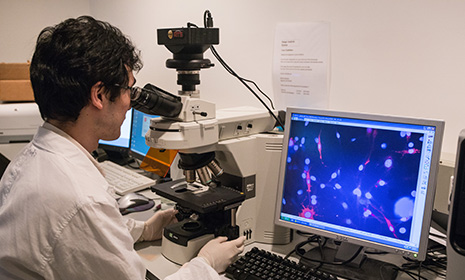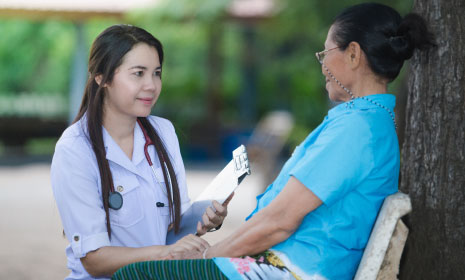Asia Premiere of Film and Book Sharing on Clean Hands Save Lives by School of Public Health, Li Ka Shing Faculty of Medicine of HKU
The WHO Collaborating Centre for Infectious Disease Epidemiology and Control at the School of Public Health, Li Ka Shing Faculty of Medicine of The University of Hong Kong (HKU) hosted the Asia Premiere of Film and Book Sharing on Clean Hands Save Lives at HKU today (January 6, 2017), with support from the Hong Kong Research Grants Council's Theme-based Research Scheme on Viral, Host and Environmental Determinants of Influenza Virus Transmission and Pathogenesis. The film Clean Hands was presented in Asia for the first time at the University and a book-sharing session on Clean Hands Saves Lives, published in 2014 and translated in 11 languages, was held following the film premiere. Over 200 healthcare policy leaders, clinical practitioners, scientists, academics and students had attended the event, including senior government officials such as Dr Constance Chan, Director of Health; as well as Dr KH Wong, Controller of the Centre for Health Protection.
“Every day throughout the world, at least half a million persons contract a nosocomial infection, which are diseases acquired during the health care process. Nosocomial infection kill more than AIDS, malaria and tuberculosis combined and it continues to be the second biggest cause of mortality in the west, tied with cerebrovascular accidents such as stroke. The WHO Collaborating Centrefor Infectious Disease Epidemiology and Control at HKU School of Public Health has been a staunch supporter of the World Health Organization’s Clean Care is Safer Care campaign and is committed to scientific research and training in promoting the importance of hand hygiene in healthcare, said Professor Keiji Fukuda, Clinical Professor of School of Public Health, Li Ka Shing Faculty of Medicine, HKU and former Assistant Director-General for Health Security and Special Representative for Antimicrobial Resistance, World Health Organization, in his welcome address.
“It gives us great honour to host the Asia premiere of the film Clean Hands in the presence of our guest of honour, Professor Didier Pittet, who has pioneered the use of alcohol-based handrubs,a universal standard of quality in hospitals and other health care institutions. Few people are aware that this revolution was born in Geneva, Switzerland in 1995 by Professor Pittet’s team and his hand hygiene model has since been adopted by the World Health Organization in 2005 and is being implemented by 90% of the member states of the United Nations as of today,” said Professor Fukuda.
The Asia film premiere was followed by a Q&A and Booking-Sharing Session by our guest of honour, Professor Didier Pittet, Director of Infection Control Programme and WHO Collaborating Centre on Patient Safety, The University of Geneva Hospitals and Faculty of Medicine, Geneva, Switzerland. “Hand hygiene has proven to be the most vital measure in infection control in hospitals. The increased participation of the Clean Care is Safer Care campaign and the annual World Hand Hygiene Day on 5 May by hospitals and healthcare institutes worldwide shows that hand hygiene efforts continue to be prioritised and sustained worldwide, especially when combined with other important goals such as combating antimicrobial resistance,” said Professor Pittet. “Professor Pittet’s medical odyssey in promoting hand hygiene and in battling against hospital-related infections are recounted in the book Clean Hands Save Lives and he has truly revolutionised the fight against nosocomial illnesses and help save millions of lives worldwide,” added Professor Seto Wing-hong, Co-Director of the WHO Collaborating Centre for Infectious Disease Epidemiology and Control at HKU School of Public Health, who helped moderate the Q&A and Book-Sharing Session.
About the film Clean Hands
Hospital-related infection is a global challenge killing 16 million people per year throughout the world. Ambassador to the World Health Organization Professor Didier Pittet has been promoting the “Clean Care is Safer Care” campaign around the globe for the last 20 years. Professor Pittet’s actions and the generalisation of alcohol-based handrub have cut by half the toll death directly due to nosocomial infections. Clean Hands tells the story of Professor Didier Pittet who has dedicated his whole life to studying nosocomial infections. It is an odyssey made of touching encounters and will enable people to better understand the challenges presented by healthcare-associated infections. The film was awarded the Finalist's Prize in the 5th Deauville Green Awards and in the International Film Festival and Forum On Human Rights - Geneva 2016.
About the book Clean Hands Save Lives
Every year hospital-related infections kill 16 million patients. Professor Didier Pittet is reducing these numbers by half. His crusade is recounted in a book that came out on the sixth anniversary of the World Hand Hygiene Day on 5 May 2014. Translated into seventeen languages (including Arabic, Chinese, English, Farsi, French, German, Italian, Japanese, Polish, Portuguese, Spanish, Romanian, Urdu, etc.), the book was published under a Creative Commons license by Editions L’Âge de l’Homme and the author has assigned the entirety of his book rights to the Clean Hands Save Lives Fund, which will enable more lives to be saved every time the book is purchased.
About the WHO Collaborating Centre for Infectious Disease Epidemiology and Control at the School of Public Health, Li Ka Shing Faculty of Medicine, HKU
The School of Public Health, Li Ka Shing Faculty of Medicine of The University of Hong Kong has been designated as a WHO Collaborating Centre for Infectious Disease Epidemiology and Control with effect from 10 December 2014. The designation of the HKU School of Public Health(HKU SPH) as a WHO CC is the first of such kind at the University. HKU SPH has a long and distinguished history in public health education and high impact research. With world leading research in infectious diseases as well as on non-communicable diseases of both local and global importance, the School has made significant contributions through its research and advocacy to improve the health of populations and individuals, both locally and globally. The School is a leading research and teaching hub in public health on influenza and other emerging viruses, control of infectious and non-communicable diseases, tobacco control, air pollution, psycho-oncology, behavioral sciences, life-course epidemiology, and health economics, health services planning and management. This work has informed international (e.g. the World Health Organization, Food and Agriculture Organisation of the United Nations), national and local public health policies.
RGC Theme-based Research Scheme on Viral, Host and Environmental Determinants of Influenza Virus Transmission and Pathogenesis (2014-2019)
Awarded by the Hong Kong Research Grants Council, this five-year programme is an interdisciplinary collaborative project in influenza virus transmission and pathogenesis involving The University of Hong Kong, The Chinese University of Hong Kong and The Hong Kong University of Science and Technology. It aims to enhance global public health, provide high quality research, intellectual capacity, real-time data to inform local, national and global health policy, train the next generation of scientists and help maintain and enhance Hong Kong's world-leading status in influenza research.
Professor Keiji Fukuda, Clinical Professor of School of Public Health, Li Ka Shing Faculty of Medicine, HKU, delivered a welcome address in Asia Premiere of Film and Book Sharing on Clean Hands Save Lives.
Professor Didier Pittet, Director of Infection Control Programme and WHO Collaborating Centre on Patient Safety, The University of Geneva Hospitals and Faculty of Medicine, Geneva, Switzerland, and Professor Keiji Fukuda, Clinical Professor of School of Public Health, Li Ka Shing Faculty of Medicine, HKU, promote the importance of hand hygiene.










.png)
